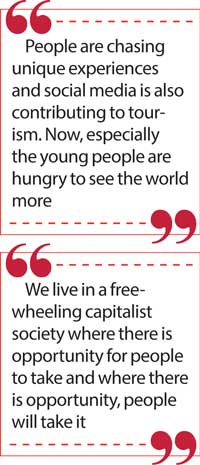Sunday Feb 22, 2026
Sunday Feb 22, 2026
Friday, 1 December 2023 00:00 - - {{hitsCtrl.values.hits}}

Chef Gary Mehigan
The renowned British-Australian Michelin Star celebrity chef and former judge of MasterChef Australia Gary Mehigan recently arrived in Sri Lanka for a three-day culinary extravaganza in partnership with Cinnamon Hotels and Resorts. The line of events called, ‘The Master Table by Gary Mehigan’ presented by Cinnamon Hotels and Resorts, include two personally curated full-course dinners by Gary himself, followed by a specially curated Carvery and High Tea evening on the third day.
In an exclusive interview, Daily FT spoke to Mehigan who shared insights on the growth of the culinary industry, the subsequent economic impact and the opportunities created through the changes in the industry. He explained that the culinary world was inevitably intertwined with tourism and the economic aspects of a country where hospitality has become an environment of entrepreneurship for people-people.
As a devoted food and travel enthusiast, Mehigan further stressed on the need for confidence in the country’s attributes, services and heritage on a global stage while developing the idea of Sri Lanka.
Below are some excerpts from the interview:
By Divya Thotawatte
Q: How does the culinary industry contribute to the overall economic landscape of a country?
 It is a massive contributor to the economy. Even in Australia, it is huge. Hospitality is seen as a difficult industry only because it has not been seen as particularly entrepreneurial before, but it is now. Back when I was training, anyone who trained to be a chef, became just a chef. Today, you can be a chef and if you learn even one recipe, you can turn it into a business. We have seen this kind of thing happen over and over again, and this entrepreneurial path has also been attracting many people into the hospitality industry.
It is a massive contributor to the economy. Even in Australia, it is huge. Hospitality is seen as a difficult industry only because it has not been seen as particularly entrepreneurial before, but it is now. Back when I was training, anyone who trained to be a chef, became just a chef. Today, you can be a chef and if you learn even one recipe, you can turn it into a business. We have seen this kind of thing happen over and over again, and this entrepreneurial path has also been attracting many people into the hospitality industry.
We have seen restaurants going from restaurants to multifunction spaces or home-delivery specialists/dark kitchens or to offering unique dining experiences that we would not even have thought about 20 years ago – like a farm focused on provenance and sustainability, or a restaurant 300 metres in the air, hanging off a crane, doing a sky-high dinner. Food festivals are also part of that. For example, Melbourne Food and Wine Festival is one of the biggest food festivals in the Southern hemisphere and attract people from all over the world. It is important to the state’s success.
Even though COVID got it down, travel has not slowed down, it has bounced back up. People are chasing unique experiences and social media is also contributing to tourism. Now, especially the young people are hungry to see the world more.
Q: In your opinion, how important is the collaboration between the culinary industry and the tourism sector in maximising the economic benefits for a country like Sri Lanka?
I don’t think you can separate the two. Everything goes hand in hand. If you are attracting people to Sri Lanka, whether it is a conference or summit, or even if your city is the epicentre of a particular businesses like IT or aerospace, you need hospitality and accommodation around them.
We live in a freewheeling capitalist society where there is opportunity for people to take and where there is opportunity, people will take it. So when you got people coming in, you will have accommodation on all levels from 6-star and 5-star down to homestays. Along with accommodation, there will be food and culinary experiences available on all levels too.
If you are in a country like Sri Lanka where you’ve got beautiful beaches, mountains and mangroves, you are a tourist destination in itself. There are many reasons for you to come here. You can’t have one without the other, and if you can create great experiences like exploring spices and plantations or even just lying on the beach sipping a martini, they will keep coming back.
Other industries will also pop up. Training organisations for staff will pop up and every associated industry like food production, IT, marketing, and maintenance will also expand. The employment created, the revenue and the contributions made will be endless.
 Q: From your international perspective, how does Sri Lankan cuisine stand out and attract tourists compared to other global culinary scenes?
Q: From your international perspective, how does Sri Lankan cuisine stand out and attract tourists compared to other global culinary scenes?
Sri Lankan cuisine is beautiful. We got a big Sri Lankan community in Melbourne, and Australia in general, so we are familiar with Sri Lankan food. It is attractive because it is delicious. People know that it is going to be spicy, complex and interesting. What appeals to the Australian market especially, is the familiarity they have with Sri Lankan food. Things like hoppers and curries are all flavourful, spicy and interesting. The seafood here is also great. Together with the clean green and the blue ocean, it is not a bad place at all, is it?
One of the things I noticed coming in to the city yesterday was how well-represented you are in hospitality– you got great hotels and restaurants, it is a beautiful city with everything on its doorstep. It is exciting because it means a great holiday.
Q: How can a country leverage its culinary heritage to create a unique identity that attracts tourists and positively influences the economy, based on your observations on Sri Lanka?
It is not a marketing exercise. When a country becomes confident at what it does, when chefs would travel, when they love what they do and they would run great places that provide delicious food, there is a confidence that comes with that. It does not need to be marketed because if you like something, like a restaurant, you will keep coming back to it.
I think the industry could use more collaborations rather than anything else. Collaboration is the buzzword at the moment, but it is a natural thing that has been happening for a long time where chefs come and exchange ideas.
It could be about marketing too but I think it is more about having a strong, confident and vibrant industry. For example, without the marketing, what is already attractive about Australia is people’s idea of what it is, it is clean, it is beautiful, it’s got gorgeous beaches and we have a vibrant, multicultural communities with people who love their food and as extensions of that, we then end up with great restaurants, bars, etc.
 Q: From your experiences working internationally, what lessons or strategies could Sri Lanka adopt to further enhance the economic and tourist impact of its culinary industry?
Q: From your experiences working internationally, what lessons or strategies could Sri Lanka adopt to further enhance the economic and tourist impact of its culinary industry?
Things like the first contact is really important. For example, as a tourist, when I get on SriLankan Airlines, I want a taste of Sri Lanka so that I feel like I’m on holiday already. Even if I’m in a comfort zone, it will like I’m on the way. You can make a great first impression.
It is also that people chase a romantic idea or fantasy of what a country like Italy or France is. It could be from social media, or a government or not-for-profit initiative. It may or may not match your expectation and often it doesn’t, you get lost as a tourist. But what is the most important is the vibrant culture, communities of people, and entrepreneurs looking to be better. The sum of all those things make a good experience.
If you come on holiday and it is safe, clean, beautiful, and there is great accommodation and great service along with the great food, then you can attract more people. People will go away feeling like a king or a queen because they’re being looked after. The sense of generosity, warmth and hospitality pervade the place they have visited. They will then tell their friends and family and lots of people will come.
You know, they say “sell the benefits, not the beaches.” If you try to market long, white sandy beaches, it is not a great sales pitch. But the benefit could be that it is the most relaxing, spiritual, wonderful holiday that you’ve ever had. You have to sell the idea of something. Imagery plays an important part, but it is also about setting an expectation and delivering on it too.
Pic by Sameera Wijesinghe